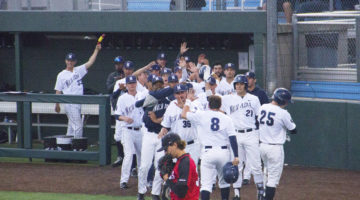
Nevada Baseball Head Coach T.J. Bruce discusses a play with an umpire during Nevada’s game against Air Force on Sunday, March. 26 2017. Baseball America picked Nevada baseball’s most recent recruiting class as one of the top under the radar classes in collegiate baseball.
By the time the sun starts to rise Head Nevada Baseball Coach T.J. Bruce has already been up for two hours. Bruce starts his day at 4:30 a.m., gets a few things done in his office and heads down to the weight room to evaluate his players and motivate them. There is no such thing as a case of the Monday’s for Nevada Baseball or Bruce.
“I slept in today, I got here at 6:30 a.m.,” said Bruce.
When Bruce makes it to the weight room he relinquishes his rights as coach. He’s not in charge here, as he leaves the coaching to the baseball team’s strength and conditioning Coach Ardery. Ardery get’s the team warmed up with some simple stretches, yelling out from time to time “don’t cheat the warm-up.”
If there were players that truly did cheat the warm-up it’s fair to say they have no place on Bruce’s baseball team.
“We have a saying in this program, it’s called prepare to prepare,” said Bruce. “Another one is be in the moment and another one is control the controls.”
Bruce makes it a point to ingrain these sayings in his player’s heads because he understands that loving the process it what it takes to become successful.
Bruce was a stud in high school and college baseball. His work ethic was championship like, and the achievements that followed were all because he bought into the process. While in high school Bruce was named to Long Beach Press Telegram’s Dream Team as a shortstop and walked out of high school with two league MVP’s and a league championship under his belt.
With such an impressive resume, Bruce appeared to have the chance to go play baseball anywhere he dreamed but he had one thing holding him back.
“I was a non-qualifier,” said Bruce. I couldn’t go to a four-year school. My GPA and my test scores were too low.”
Granted this was a huge roadblock, but Bruce never allowed it to stop his drive or determination to continue to pursue one of the two sports he fell in love with when he was growing up. Bruce could have very well been the worlds next Travis Pastrana, but baseball called to him much louder than dirt biking ever would.
From high school, Bruce went to a JC called Cerritos College where he spent the first two years of his collegiate baseball career. Here he earned All-South Coast Conference honors, all the while leading the team to the first round of the Southern California College playoffs two years running.
Bruce then moved on to play at Texas Tech for a year and finished off his playing days at Long Beach State under Dirtbags head coach Mike Weathers.
This was when Bruce found himself at yet another crossroad. Where to go next?
“I always say the game retires ya,” said Bruce. “The game was telling me that I wasn’t good enough to move forward and I was ok with it. It’s tough playing a game for so long and not playing it anymore. Took some time that summer in ’04. My wife was my girlfriend at the time so we took some time to decide where I was going. I had one more year left of school. Weathers called me to say ‘ I want you to be the undergraduate.’ I turned him down.”
At this time Bruce thought he was ready to get out of baseball and say sayonara to the sport he spent his whole life attempting to perfect. Weathers called Bruce back a second time, and Bruce once again denied Weathers, but Weathers had some advice for Bruce this time.
“’Let me tell you that I think you’ve got a career in this thing if you want it,’” said Weathers. “But coaching you can’t do if you don’t have the passion for it.”
Bruce, still not convinced appreciated the words from his former coach but still did not come on as the undergraduate.
Finally, Weathers called Bruce one last time and asked him again. Bruce said he needed to make money and as an undergraduate coach, you didn’t get paid. Weathers told Bruce he got him a job that was contingent on him coming on as the undergraduate.
For the entirety of the ’05 season Bruce woke up at five in the morning, worked at the docks in Long Beach from 5:30 a.m. to 12 p.m., then went to practice and went to school.
But after that season Weathers let Bruce go.
“’Hey I think you need to get away from Long Beach and go find yourself as a coach, ‘” said Weathers.
While Bruce admitted this was the time he had to decide if he was going to make a career out of coaching or not, these thoughts did not deter him from taking the next step and heading to Cerritos College to be an assistant coach at the school he played his first college ball games at.
“Going back to coach there was a no-brainer,” said Bruce.
However, Bruce’s time at Cerritos as an assistant coach was even shorter-lived than his playing days there. Weathers hired Bruce on the following season in ’07 as the assistant coach at Long Beach State. Bruce coached under longtime friend and coach Mike Weathers for three seasons, helping lead the Dirtbags to numerous NCAA Regional appearances.
In 2010 Weathers decided to hang up the whistle and call it quits. Weathers passed the team off to Troy Buckley, a highly respected pitching coach. Buckley decided against keeping Bruce on as an assistant coach leaving Bruce out of a steady job, with a wife and a six-month-old daughter.
“I worked with and played under coach Buckley, so coach Buckley didn’t keep me on,” said Bruce. “Which is his choice, and we’re great friends to this day,”
Just as any job, there are no hard feelings when a party decides to part ways with another. Baseball’s a business, and Bruce knows this and respects it.
With Bruce out of a job, it appeared that five years into his coaching career it was over just as fast as it began.
Until one fateful day.
“The phone call, I’ll never forget,” said Bruce. “I was in Alaska and I was coaching summer ball. I had a daughter that was six months old, I had no insurance, did not have a job. I made $4,000 that summer coaching in Alaska. But John called me in July and offered me a job at UCLA and changed my life. John’s the reason I’m sitting here today. I went from no benefits, no insurance, kids, making $4,000, to one of the best baseball jobs in the country, for one of the top baseball coaches to ever coach. John gave my family a heartbeat.”
In 2011, Bruce joined coach Savage at UCLA as an assistant coach. Bruce was UCLA’s recruiting coordinator and just as he’s done at Nevada, Bruce made waves with the Bruins. The Bruins second-ranked signing class in the nation according to Baseball America in 2012 was in large part because of Bruce’s ability to put together a strong recruiting plan and because Bruce understood there was more to recruiting than just the player.
“You’re not just recruiting kids, you’re recruiting entire families,” Bruce said. Because the family has to be on the same page as me. They’re dropping their son off to me for the next three years and in those three years I’ll have a greater impact on their life then their family will.”
With as huge of a decision as deciding where to spend the next four years of your collegiate career, Bruce knew it was imperative that he got the family onboard with the plan as well.
While Bruce is a recruiting genius, Nevada has another one in Athletic Director Doug Knuth. He too understood the importance of ensuring that his offer was appealing to not only the candidate but his family as well. Just as any decision in Bruce’s life when offered the Nevada head coaching job he never was impulsive about it.
“I’ll never forget, the Nevada job came open and John had ties here because he grew up here,” said Bruce. “He says ‘do you have interest in Nevada?’ My first response was what do you think? He goes ‘I think it’s a great job.’
While being on a 25-day recruiting trip coach Bruce got an email from Knuth. He was back home for one day before going out on another recruiting trip. While at home Bruce showed his wife and they both decided it was worth looking into. Bruce emailed Knuth back saying he was interested. Bruce was in Fort Myers the next seven days when he got a call from Knuth saying he wanted to set up an interview. Since Bruce still had obligation to UCLA at the time he had to fit the interview into his schedule as a recruiter. Bruce ended up buying a suit in Phoenix just so he could come to Nevada to interview with Knuth.
After the interview, Knuth called Bruce about three days later offering him the Head Coaching job at Nevada.
“I said I appreciate the offer; can I think about it?” Bruce said. “Knuth said no problem. I told him I was going to call him back the next morning. I didn’t call. He called me that afternoon and goes ‘hey what’re you thinking?’ Just being in tune with my family, our eight-year-old is a lot like I was growing up and she has to see things. So I said hey I need to fly my family up there.”
Bruce ended up driving up with his entire family to visit Nevada. When Bruce and his family got to Reno, Knuth took six hours out of his demanding life to talk to Bruce and his family and help mitigate any fears they might have of moving to Reno.
“We went back to the hotel and I still didn’t have an answer,” said Bruce.
Bruce then called multiple mentors of his to talk about the deal and see if he was doing the right thing and finally that night Bruce was prepared to answer Knuth.
“My wife was sleeping, my parents were sleeping,” said Bruce. It’s an emotional day. I called Doug back by myself and I told him I was going to take the job. He goes ‘no way?’ I said yep! I want to be here. My family loves it here, I love it here. He goes ‘can you be ready in a half hour, there’s an Italian dinner downstairs?’ So I met Doug downstairs and the rest is history.”
The time Knuth took with Bruce’s family, his patience and persistence were the key factors as to why Bruce came to Nevada.
Bruce did not walk into this coaching job with the best circumstances. Upon his arrival, Bruce had just 10 position players as everyone else transferred with the changing of the guard. Along with this Bruce also had to endure the death of his father that same year.
Even with these challenges Bruce still managed to have an impressive 2015 season. Nevada led the Mountain West with a .977 fielding percentage, setting a new program record and ranking in the top 25 nationally. Along with this Nevada was the only team in MW play to rank in the top three in team batting, pitching and fielding.
Although winning is important, Bruce isn’t necessarily interested in just the end result.
“I want to win another National Championship, without question,” said Bruce. “But I always think there’s a process before the result. The process of it is everything done up until that day, till whenever the result comes. I don’t chase wins, this program will never chase wins and it’s not going to chase a result.”
Bruce wants his players to grow in all walks of life, not just simply baseball.
“I want our young men to be good fathers, good husbands,” said Bruce. “I want them to be equipped with tools to help them in life. Are we hard on them? No question. Are we demanding? No question. But life’s demanding. Being a father is demanding. Being a husband is demanding.”
Head Nevada baseball coach T.J. Bruce is a loving father, caring husband, and dedicated coach. While he is all about living in the moment and worrying about what’s happening now, he has some incredible foresight.
“After about 80 pitches I start to take a look at guys to shut down,” said Bruce. “I want them to be able to play catch with their kids.”
With Nevada baseball improving year after year, this team is poised for greatness. Just as coach Savage gave his family a heartbeat, coach Bruce has given Nevada baseball one as well.












